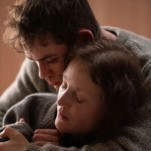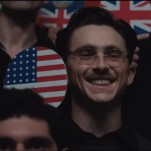Louis Theroux’s Ten Most Revealing Documentaries
If ever there was a journalist who delivers great stories and cracks us up, it’s Louis Theroux. Whenever he finds himself amidst dodgy characters and frightening situations, his nerdy look and his unworldly approach make him come across like a private-school boy lost in the world’s ghetto. You can literally absorb his unease when faced with intimidating people or extreme circumstances, but it won’t stop you from laughing at/with him: His innocence and cheek is what make him the amazing journalist he is. His presence isn’t threatening or haughty—on the contrary, people tend to feel at ease with him, and he is genuinely interested in gaining a better understanding of his subjects.
He started out writing for publications like Spy magazine before taking his thoughts in front of the camera with BBC’s Louis Theroux’s Weird Weekends (1998-2000). Following the success of his weird weekends away with born-again Christians, survivalists and swingers, he continued with a new program, When Louis Met… (2000-2002), in which he followed British celebrities in their daily activities. He continued to film specials for the BBC Two, concentrating on various social issues and human interest stories. March saw the release of his 26th feature length BBC Two documentary By Reason of Insanity. He spent one month in Ohio’s mental hospitals, which house patients who were found NGRI—Not Guilty By Reason of Insanity—for the crimes they have committed. On his official website, Louis stated:
“I won’t give you all the details of what I found inside the hospital. You can watch the shows for that. I will just say that it is a harrowing, moving, occasionally funny portrait of a very varied and vulnerable patient population.”
As if this subject matter wasn’t difficult enough, Louis then went on to San Francisco to meet children with gender dysphoria. In this second documentary, he discusses the gravity of the decision the parents of Transgender Kids face and offers viewers personal, educational and medical insight into hormone therapy, puberty blockers and the overall pressures and concerns of the subjects and their family members. Although this program can be hard to digest at times, it is an extremely important one that has the power to be a real eye-opener to those who are quick to judge. Once you hear five-year-old Camille (formerly Sebastian) firmly state that she never wants to go back to being a boy, you will come to understand that her position is more than merely a phase of childish exploration or confusion.
In order to celebrate Theroux’s new specials and his past journalistic endeavours, we’ve put together a list of his best documentaries so far. Brace yourself—it’s gonna get weird.
10. BBC Two Special: Law and Disorder in Lagos (October 10, 2010)
To the untrained eye, the Nigerian streets of Lagos are ruled by chaos. Once you’ve familiarised yourself with the importance of the transportation union and the power it holds over private individuals and stall holders, you will come to realize that there is an intricate, albeit corrupt system at play. Louis travels to Lagos in the hopes of meeting one of the city’s king players, namely “MC”, a transport union executive who seems to enjoy the same kind of status Snoop Dog does in the U.S. Louis is introduced to MC, his eager spokesman Mammok and various “Area Boys,” who offer him a strange glimpse into the inner-workings of Lagos’ politics.
9. Weird Weekends: Porn (January 29, 1998)
Most of us have had a little sneaky peak at one porn film or another in our life time (nothing to be ashamed about). Suffice to say, what we see on screen is merely a collage of many hours spent finding the perfect angle and waiting around for the obligatory money shot. Louis travelled to L.A. for a behind-the-scenes look at the porn industry, its actors and the many challenges they face. Being a porn actor/actress may be seem like a dream job for excited wannabes, but the reality often isn’t all that glamorous. Louis is invited on set of a porn film to learn about “wood problems” and “inconclusives” and even auditions for a film himself.
8. When Louis Met The Hamiltons (December 11, 2001)
The Hamiltons may not mean much to our U.S. readers, but they made quite the name for themselves in the UK back in the early noughties. Neil Hamilton), a former Conservative MP, was disgraced after his involvement in the Cash-for-Questions-Affair in 1994. By 2001, Neil and his wife were ready to reinvent their public image and appeared on When Louis Met. There’s a contradictive feel throughout this episode—Neil and Christine make themselves out to be ordinary, down-to-earth people and yet specific circumstances may give the impression they are quite happy to bask in the limelight—even if it’s hostile.
7. Weird Weekends: Indian Gurus (October 2, 2000)
Curious to learn more about Westerners and their incessant search for enlightenment, Louis travels to India to meet followers of Ganapathi Sanchidananda, Amma, Osho and various other illuminated folk. Former professor Joseph “Deepak” Vidmar introduces Louis to various strange meditation techniques involving screaming, jumping, a form of aggressive Pranayama (breathing exercises) and even dancing. Watching Louis jump around with snot flying from his nose is priceless. He then moves on to follow Ramanan and 400 other Amma disciples on a pilgrimage around India, trying to answer the question: “What is the status of a guru? Are they gods, are they humans, are they somewhere in between?”
6. When Louis Met Jimmy (April 13, 2000)
Jimmy Savile is said to be a lot of things. On the positive side, he is said to have been the first DJ to use two turntables for continuous music; on the negative side, he is said to be a pedophile. When Louis asked his childhood hero to appear on his program, he was pleasantly surprised by Jimmy’s willingness to do so. Looking “quite hip hop and rap,” Jimmy welcomed Louis into his pink/grey Leeds apartment and his estates in Scarborough and Glencoe. They soon find themselves at a difference of opinion in regard to what kind of discussions should be had during the interview. Obviously wary of “salacious tabloids,” he urges Louis to focus on the positive, instead of winding him up:
“I’m odd. You’re different. That’s not a bad double. Between us, we should be able to do something.”
-

-

-

-

-

-

-

-

-

-

-

-

-

-

-

-

-

-

-

-

-

-

-

-

-

-

-

-

-

-

-

-

-

-

-

-

-

-

-

-








































